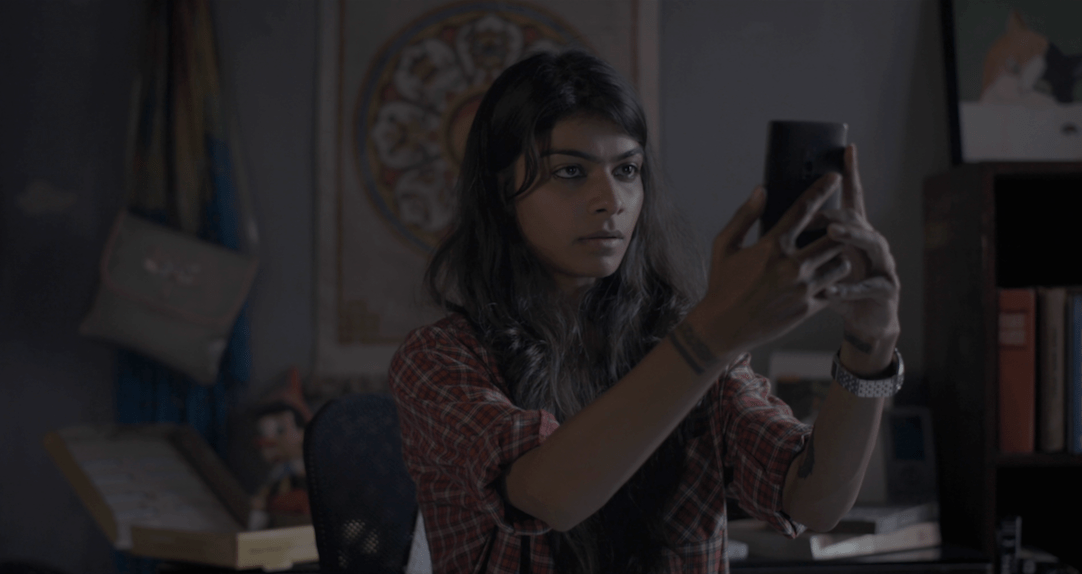In recent years, family and domestic violence services in India have increasingly recognized the unique and emerging role social media can play in addressing problems around violence against women. Earlier this year, the Climb Against Sexual Abuse campaign drew global attention when survivors of sexual abuse used Snapchat filters to hide their identity while speaking publicly about their experiences.
Nida Sheriff is the manager of Chayn India, a crowdsourced online platform for women in India experiencing domestic violence and other forms of oppression. Speaking to i-D she explains, “In Indian society it is frowned upon to talk about issues like abuse, sexual or otherwise.” But as most young people in India have mobile phones, Chayn India has found they can be a tool to help individuals seek support that may otherwise be unavailable or unsafe to access.
It’s this understanding of the phone’s vital role that led to Snap Counsellors: a service that provides support and information around domestic and sexual violence through Snapchat. The idea was conceived by advertising creative director Rajshekar Patil, who had been exploring several social projects when he became interested in the potential of the app to reach out to vulnerable parties — especially young people.
In an email to i-D he explained, “Teen domestic violence never gets spoken about in India as somehow teenagers’ problems are seen as an outcome of rebelliousness rather than a serious issue.” He wanted to use the privacy and omnipresence of Snapchat by offering counseling and support to adolescents.
Not being a healthcare worker himself, Patil reached out to Nida and Chayn India with the idea. Together, they contacted Avani Parekh from Indian counseling service LoveDoctor to round out their team and bring the plan to life. Avani brought with him almost a decade of experience working with survivors of domestic violence and sexual assault and a team of eight psychologists and trained counselors.
Snap Counsellors sends out daily Snap stories with information about mental and sexual health, relationships, unhealthy behavior, and signs of abuse. They also encourage individuals to contact them directly for counseling and assistance from Avani and his team. The nature of the app means this counseling is provided in short bites that are automatically deleted after they’re opened. It’s a tidy way to remove concerns around abusive partners later discovering emails, texts, or call records related to seeking help.
Nida continues, “Snapchat is able to provide the security and safety that those experiencing domestic violence and abuse crave, with the added benefit that the messages are automatically wiped out after the session, meaning there is little risk of the abuser finding out.” Reflecting on the tendency for abusers to monitor their victims’ phones Raj adds, “As messages delete themselves, this would give victims the confidence to come out and talk to a counselor, safe in the knowledge that their conversation would be safe. We didn’t have to build trust on the app as teens were already comfortable using it.”
While the service is open to anyone who needs it, much of the organization’s focus has been on those aforementioned teens. Nida explains that in India, when people hear the term “domestic violence” they usually think of a married, heteronormative couple. It was important for the team to acknowledge that teenagers and young unmarried people experience relationship abuse, abuse at home, stalking, and harassment by their peers. “Providing a safe space on Snapchat — a place where they are already hanging out every day — makes it just a little bit easier to reach young people in a no-judgement space,” she adds.
It’s a focus that Avani mirrors, adding: “Sex and dating are so taboo and considered to sully the ‘honor’ of women especially, coming out into the open can solve the problem of the abusive relationship but then society can come down hard on the survivor, vilifying them and isolating them even though they did the right thing.” While people like the Snap Counsellor team are working to transform this thinking, for now, Snapchat’s face filters and unsaved messages can provide the protection needed to initially reach out.
Their reasoning is showing results; Avani told i-D that 1200 people view these stories daily, and as many as 60 people reach out for help each day. The time they spend with each person varies from a few minutes to weeks depending on whether they decide to return to the service. While each snap is seconds long, going back and forth he estimates that most sessions accumulate to about 45 minutes.
For all their success, the model does still present limitations: they are unable to follow up with those who reach out to them, and working in snippets of dialog can be limiting. But Nina reflects that “For a lot of abuse survivors, just being able to tell someone is cathartic.” Avani concludes, “We provide safe space when someone feels there is none.” Snap Counsellors may be limited in their contact, but by embracing this new form of micro-counseling, they’re able to reach a section of the population previously invisible to their services.
Credits
Text Wendy Syfret
Image via Snap Counsellors
